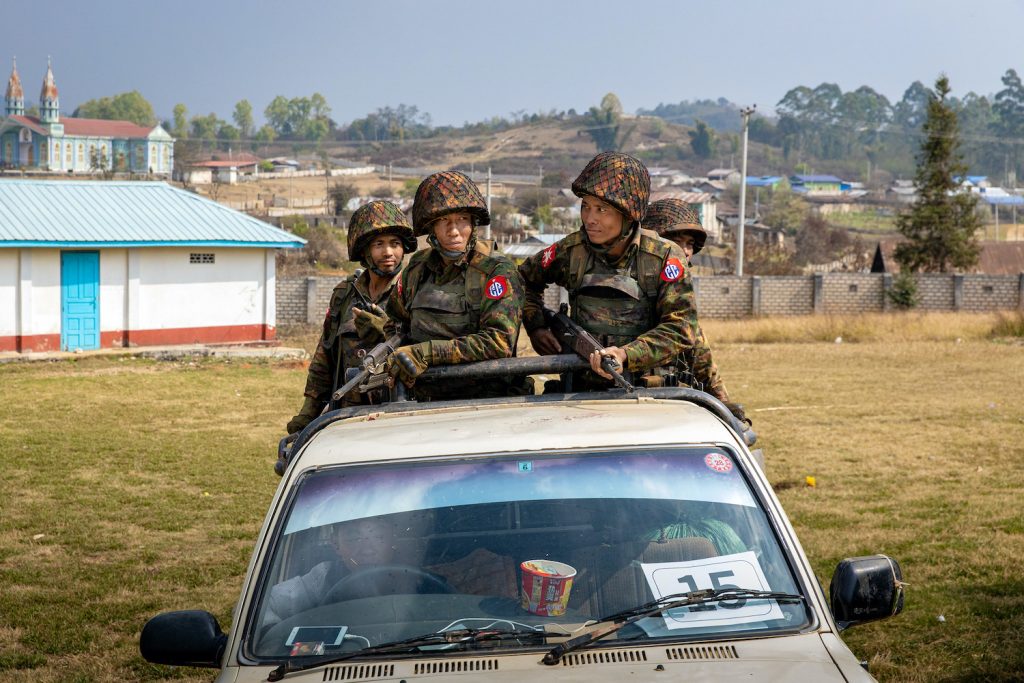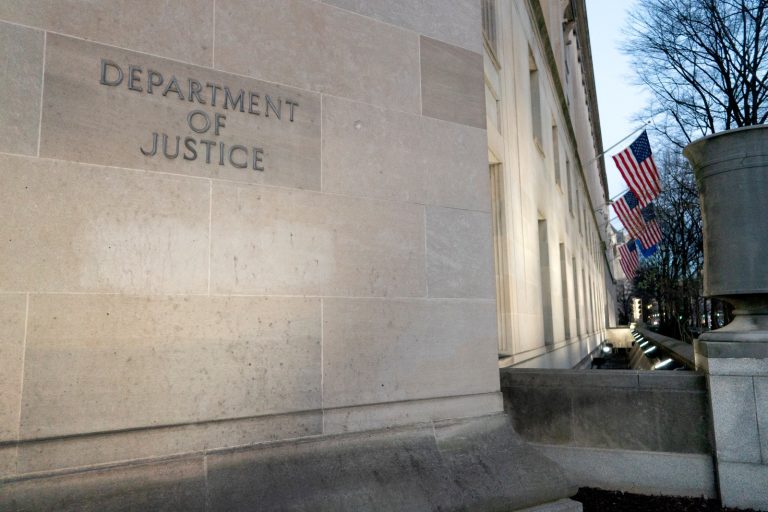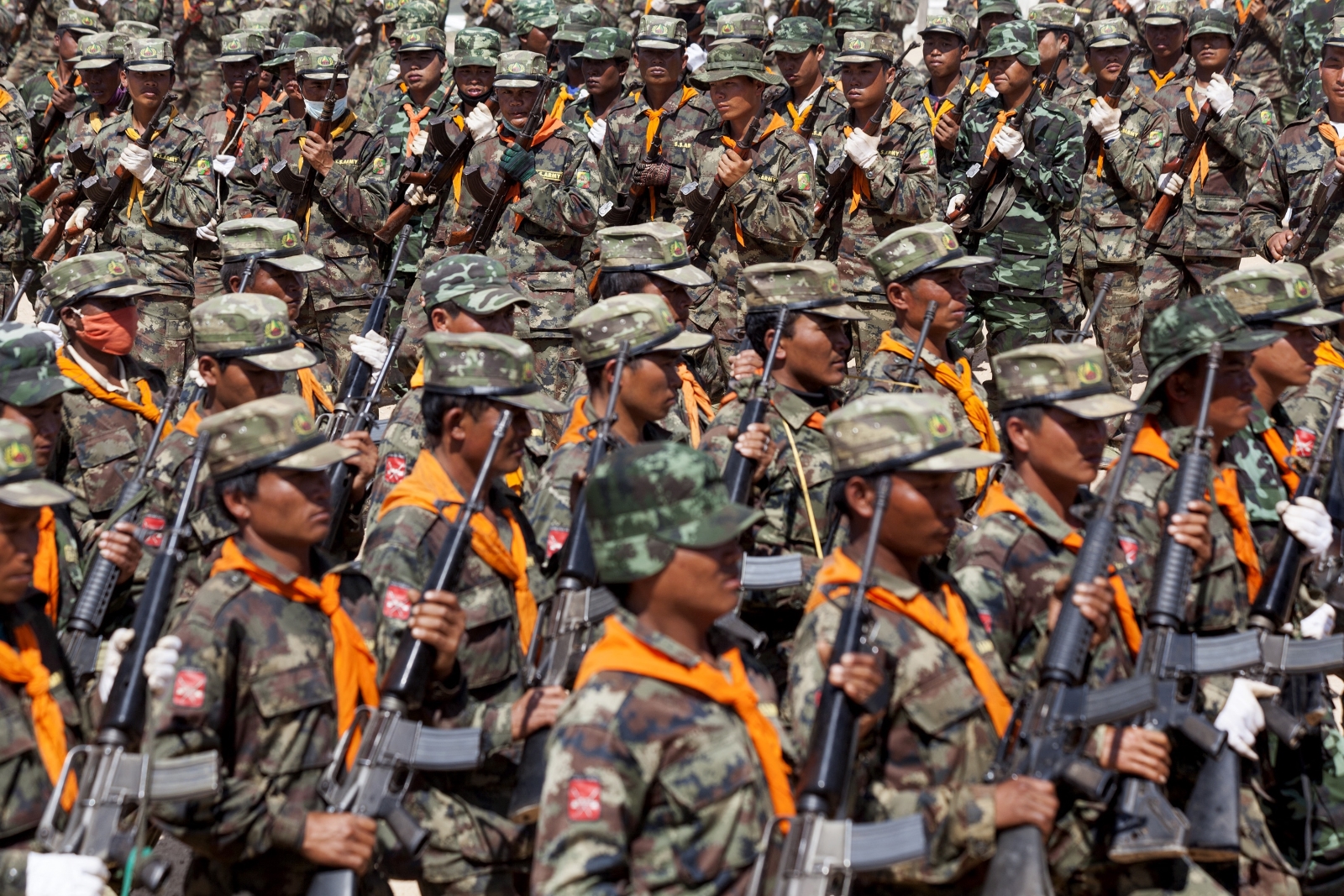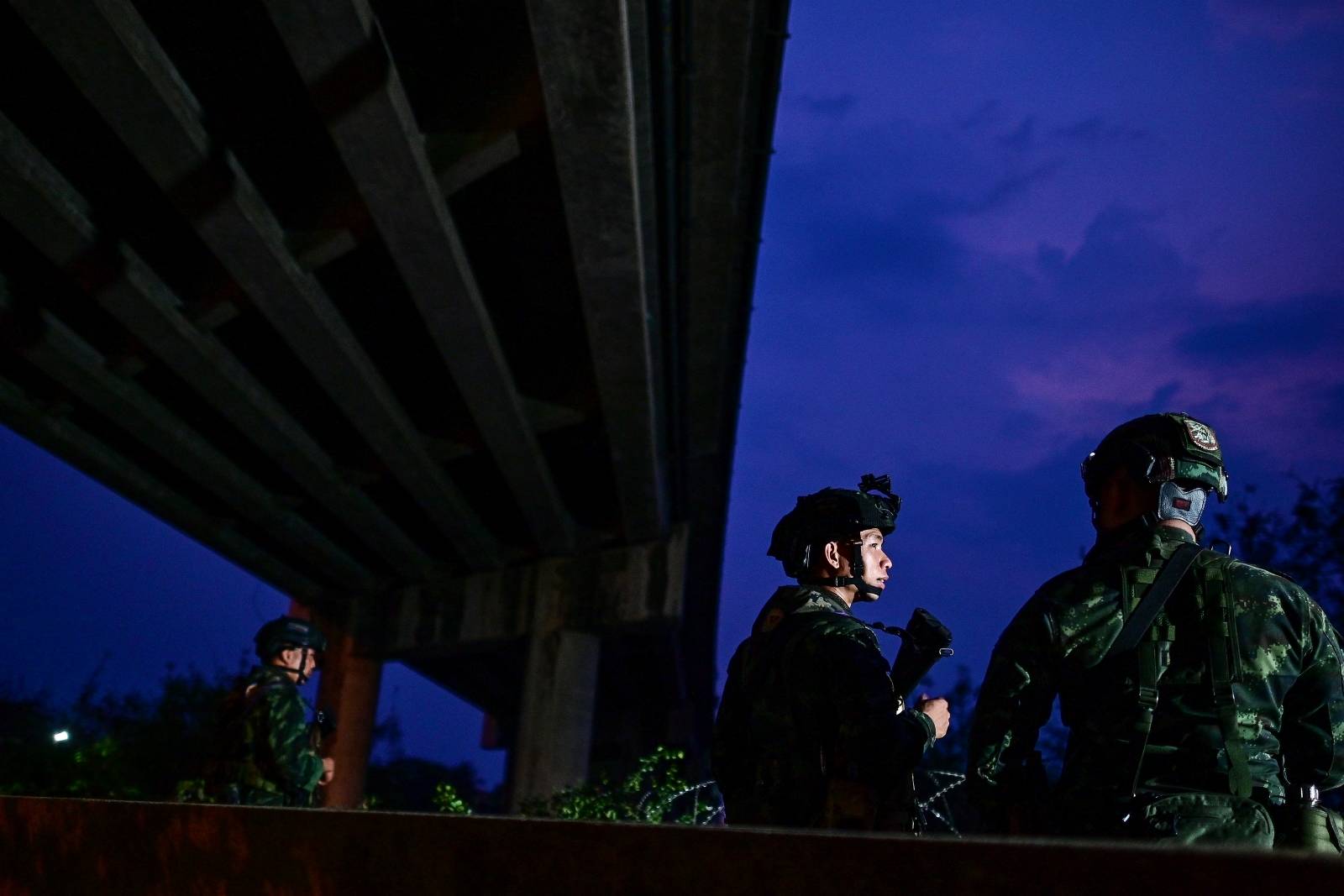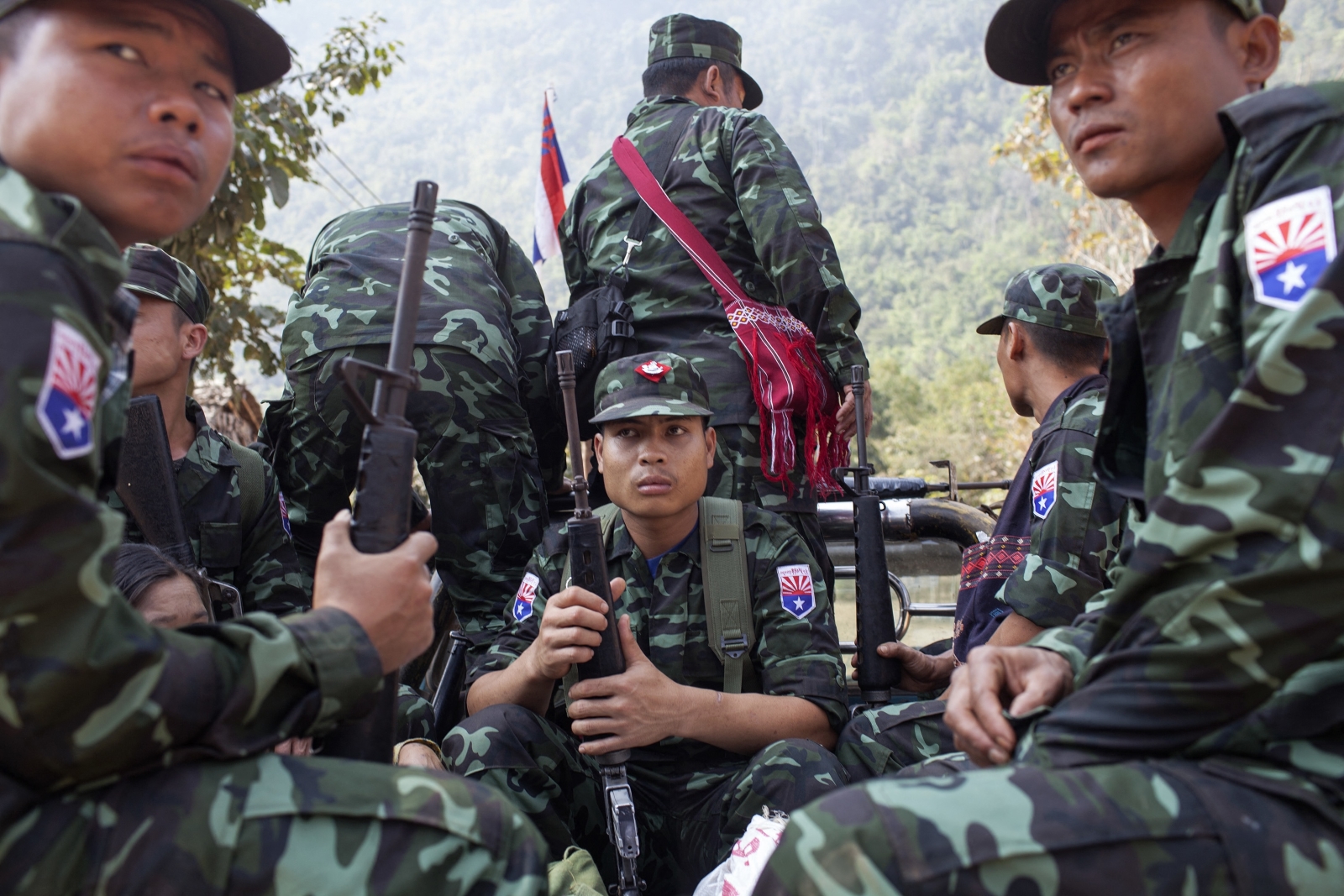Cancelled constituencies have grabbed headlines, but conflict and armed groups play a much bigger role in determining the outcome and fairness of elections in Myanmar.
By KAUNG HSET NAING, HEIN THAR and LAWI WENG
This time five years ago, the National League for Democracy was campaigning strongly in Lashio, the capital of northern Shan State, reaching out to tens of thousands of residents all across the township.
But in 2020, the election campaign in northern Shan has a very different feel for national parties like the NLD. It’s not just because of the coronavirus pandemic, which has curbed campaigning everywhere to some degree. Rather, an increase in conflict between the Tatmadaw, ethnic armed groups and local militias has hardened ethnic divisions and rendered much of the township unsafe for candidates – at least, candidates from some parties.
“Our members can only go out to some wards in downtown Lashio – they can’t go to the villages,” U Sai Yin Htun, who chairs the NLD’s township branch and is also running for the Pyithu Hluttaw seat, told Frontier in an interview at the party’s office. “In this situation we can’t do much campaigning and that will make it difficult to win.”
The party won one of four seats up for grabs in Lashio in 2015. Dr Linn Htut, who claimed the state hluttaw constituency of Lashio-1, went on to be appointed Shan State chief minister and is this year re-contesting his seat.
Party members told Frontier that they were concerned about Linn Htut’s chance of re-election, given both the limits on campaigning and perceptions that he hasn’t performed well as chief minister.
“It won’t be easy for him to win if campaigning is restricted like this,” Sai Yin Htun said.
The Union Solidarity and Development Party, which narrowly beat the NLD in the Pyithu Hluttaw seat and Lashio-2 constituency, is facing similar challenges, party officials say.
U Thura Ko Ko, the party’s information officer for northern Shan, said they want to campaign in rural areas but were mostly unable to do so because of the presence of ethnic armed groups, particularly the Restoration Council of Shan State.
“We’ve haven’t even been able to reach half of the number of people we did prior to 2015,” he told Frontier at his office in Lashio.
The experience of the NLD and USDP is in stark contrast to the Shan Nationalities League for Democracy. The party performed strongly in northern Shan in 2015, winning seven of 19 Pyithu Hluttaw seats.
“For them [the SNLD], it’s easy to go and campaign wherever they want, because no one will harm them,” Thura Ko Ko said.
SNLD officials acknowledged that the ethnic affiliation of their party was an advantage while campaigning, but downplayed any suggestion of cooperation with the RCSS. “We have an honest and simple relationship with RCSS members. Because we are from the same race, they don’t see us as the enemy. Apart from that, we don’t get any other direct benefits,” said U Sai Wan Hlaing, an SNLD central executive committee member and Pyithu Hluttaw candidate for Lashio.
He said conflict had disrupted their campaigning, too. “It’s also impossible for us to go to areas [in northern Shan] where armed clashes are occurring,” he said.
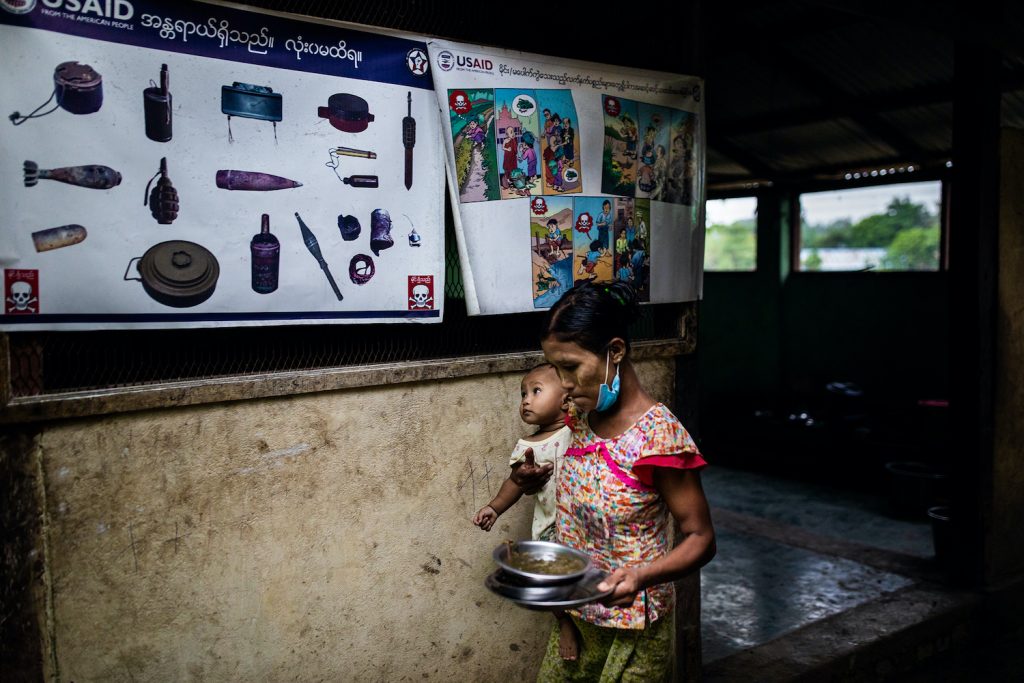
Cancelled voting
The most obvious and most analysed impact of armed conflict in Myanmar is cancelled constituencies: areas of the country where the Union Election Commission deems that it’s not possible for voting to go ahead, because of recent fighting or threats to voters or candidates, or because territory is under the control of non-state armed groups.
Conflict has affected every election in Myanmar since independence to some degree, but this year’s cancellations were more widespread – and more controversial – than in 2015 or 2010.
Voting has been cancelled in 15 entire townships – up from seven in 2015 – meaning voters in those areas will not have the chance to elect representatives to any house of parliament, although by-elections can be held from early 2022.
Voting has also been cancelled in hundreds of additional wards and village tracts in 41 townships in Rakhine, Shan, Kachin, Kayin and Mon states, as well as Bago Region. More than 1.4 million people have reportedly been disenfranchised in total.
Map created by Thibi
Among the townships in eastern Shan State cancelled entirely were four in areas controlled by the United Wa State Army and one under the control of the National Democratic Alliance Army. These had also been cancelled in previous elections, in 2010 and 2015, because the government does not have the administrative offices there that are needed to manage the vote.
Unlike in 2015, voting was also cancelled in Mongkaing, in central Shan State, where the RCSS is active.
The big difference though was Rakhine State, where voters in nine townships in central and northern areas will not have the chance to elect representatives due to conflict between the Tatmadaw and Arakan Army – mostly in constituencies that in 2015 went heavily for the nationalist Arakan National Party.
The cancellations in Rakhine were hardly unexpected, given the fierce conflict between the Tatmadaw and AA that has raged since late 2018, leaving thousands dead and around 235,000 displaced, according to civil society estimates.
Speaking prior to the announcement on October 16, Rakhine party officials said the ever-present threat of conflict meant most people weren’t interested in voting anyway.
“In this situation, it’s like urging people to walk over dead bodies to get to the polling station,” said Daw Aye Nu Sein, a spokesperson for the Arakan National Party. “Many villages are deserted, there’s no one there and no security. People are not interested in the election.”
Map created by Thibi
In such an active conflict, lack of security had been a problem for candidates from all parties, said U Maung Than Sein, the ANP lawmaker for Kyauktaw-2, where the Tatmadaw has been undertaking counterinsurgency “clearance operations” to flush out AA forces.
“Almost every day – day and night – you can hear the sound of artillery fire and machine guns,” he said.
“All political parties are facing the same insecurity,” said U Soe Lay, the NLD’s deputy chair for Rakhine State.
AA members are also active in major towns, often wearing civilian clothes.
“In Kyauktaw, Rathedaung and Minbya, you can’t even guarantee security on main roads in the downtown area,” added U Zaw Zaw Htun from the Rakhine Ethnics Congress.
In one indication of how widespread the AA’s presence has become, during a visit to Rakhine State in August, Frontier observed plain-clothed AA members detain a civilian from a bus on a highway in broad daylight. On August 23, three AA members stopped the bus on the highway near Ponnagyun, not far from the state capital Sittwe, and after checking the passengers for about 30 minutes took away a young Rakhine man.
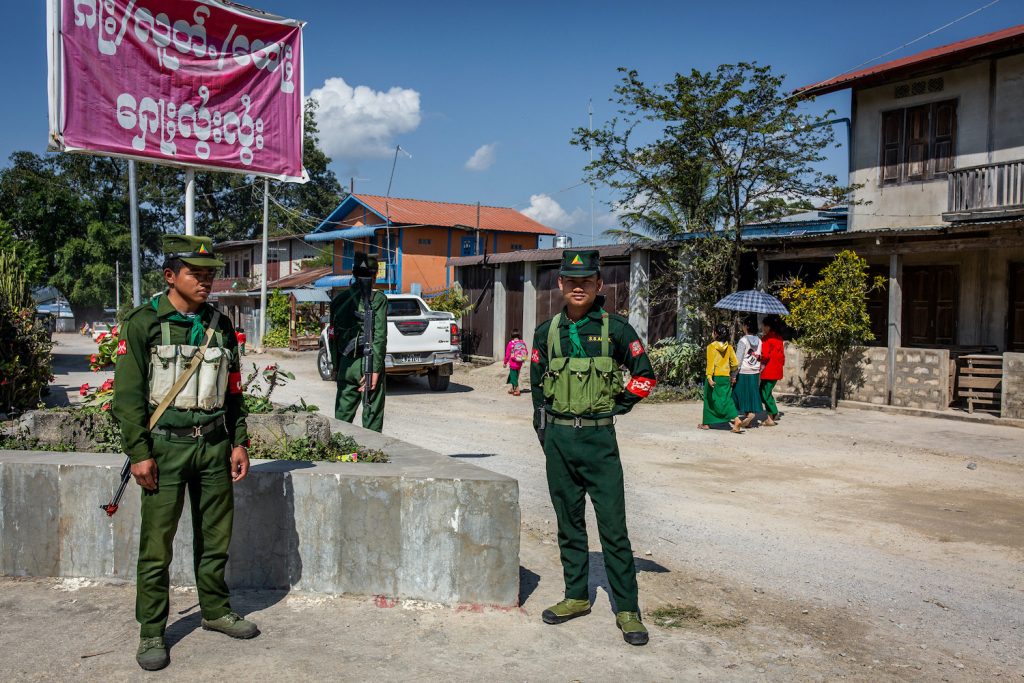
Growing influence
But the cancellations only tell part of the story about conflict and elections in Myanmar.
In Lashio, for example, where NLD and USDP candidates have been unable to campaign in most rural areas, voting was initially cancelled in six village tracts, one of which was later reinstated. Although this is an increase on 2015, when voting took place across the township, the cancellations represent a small proportion of the constituency, in terms of both geography and population.
Elsewhere in northern Shan, cancellations were limited to a few dozen village tracts and a handful of wards.
Observers say this fails to reflect the degree to which armed groups in the region have expanded their influence over the past five years. Many of the major armed groups in the region have significantly increased the size of their armies since 2015, says peace analyst U Aung Naing Oo. This includes both those that have signed ceasefires with the government and those that have not.
Following the signing of the Nationwide Ceasefire Agreement in October 2015, the Restoration Council of Shan State began shifting forces to northern Shan, sparking heavy fighting with the Ta’ang National Liberation Army, and has established a strong presence in Kyaukme and Lashio townships.
Non-signatories to the ceasefire have also grown stronger. In November 2016, the Kachin Independence Army’s Shan State brigades joined forces with the TNLA, AA and Myanmar National Democratic Alliance Army to stage brazen attacks along the Mandalay-Muse Highway, briefly capturing the border region of Mong Ko. Last year, the TNLA led more attacks along the transport artery, penetrating as far as Pyin Oo Lwin in Mandalay Region. Meanwhile, the influence of some Tatmadaw-aligned militias has also increased, fuelled by profits from the burgeoning illicit economy.
As a result, northern Shan saw more conflict than anywhere else in the country in 2019 except Rakhine State, according to monitoring by the Myanmar Institute for Peace and Security. Rising conflict is seen as likely to strengthen the trend of voters casting ballots along ethnic lines, as it has heightened a sense of ethnonationalism.
The growth of armed groups is causing a decline in democracy … The way it looks now, people just have to do what they are told by armed groups.
Official from the National League for Democracy branch in northern Shan State
Some ethnic armed groups have not been shy about exerting their influence. On September 1, the RCSS announced that political parties that want to campaign in their territory would need to inform an RCSS liaison office in advance. If the campaign trip is approved, the RCSS said it would arrange security for party members.
Parties that fail to inform the RCSS about their campaign plans would be barred from entering its territory, the group said, and according to media reports it has also threatened to fine village leaders who allow authorised campaign activities. In September there were several reports of Ta’ang National Party campaign activities being disrupted in Mongkaing Township, where voting was later cancelled.
In Mong Hsat Township in eastern Shan, the United Wa State Army has blocked several parties from campaigning in certain villages, citing the need to prevent the spread of COVID-19. Four parties have since called for voting to be cancelled in the UWSA-controlled villages, claiming a free and fair election is not possible given the restrictions on campaigning. All seats in Mong Hsat are currently held by the USDP.
These dynamics seem to have put the NLD in particular at a disadvantage to ethnic political parties that have a close relationship with ethnic armed groups.
An official from the NLD’s northern Shan branch, who asked not to be named, said that the influence of ethnic armed groups is growing “year by year”, undermining prospects for free and fair elections.
“The growth of armed groups is causing a decline in democracy,” he said. “The way it looks now, people just have to do what they are told by armed groups.”
But ethnic rivalries between minority groups can be just as dangerous. In northern Shan, a campaigner for the Shan Nationalities Democratic Party was shot in downtown Namkham on November 4, close to where both the TNLA and numerous pro-government militias are active.
Meanwhile, one of those militias, the Pansay Militia, reportedly detained two members of the Union Betterment Party on October 19, after they canvassed in the Pansay area of Namkham Township.
Not all armed groups seem to have taken the same approach, though. The Brotherhood Alliance, comprising the TNLA, AA and MNDAA, has extended a unilateral ceasefire to November 9 to enable voting to go ahead in northern Shan.
U Myo Htun, the NLD’s Pyithu Hluttaw candidate for Namkham Township, said the TNLA had allowed them to campaign freely in its territory. “We can travel and speak to the public freely, without any problems. We didn’t even need their permission,” he told Frontier.
“The TNLA already said that they wouldn’t disturb the election. They’re not really interested in the election – I think this is their approach,” Myo Htun said.
Brigadier-General Tar Bhone Kyaw from the TNLA said the group had allowed all parties to campaign in its territory, and that it was indifferent to whether the Ta’ang National Party won in ethnic Ta’ang areas.
This position of neutrality is actually a strong political statement. Armed groups that try to use their influence to engineer an outcome in the election do so because they think the political system can deliver them something of benefit. Tar Bhone Kyaw, on the other hand, said the TNLA had no faith that the election would do anything to help the group achieve its political goals.
“We don’t expect anything from the election. Whether the NLD or USDP win and form government … neither of them has any wish to resolve armed conflict. We know this already – we know fighting will continue.”
He added, “We’re not interested in the election, but because we want our people to participate in democracy, we let them vote – we don’t interrupt the election.”
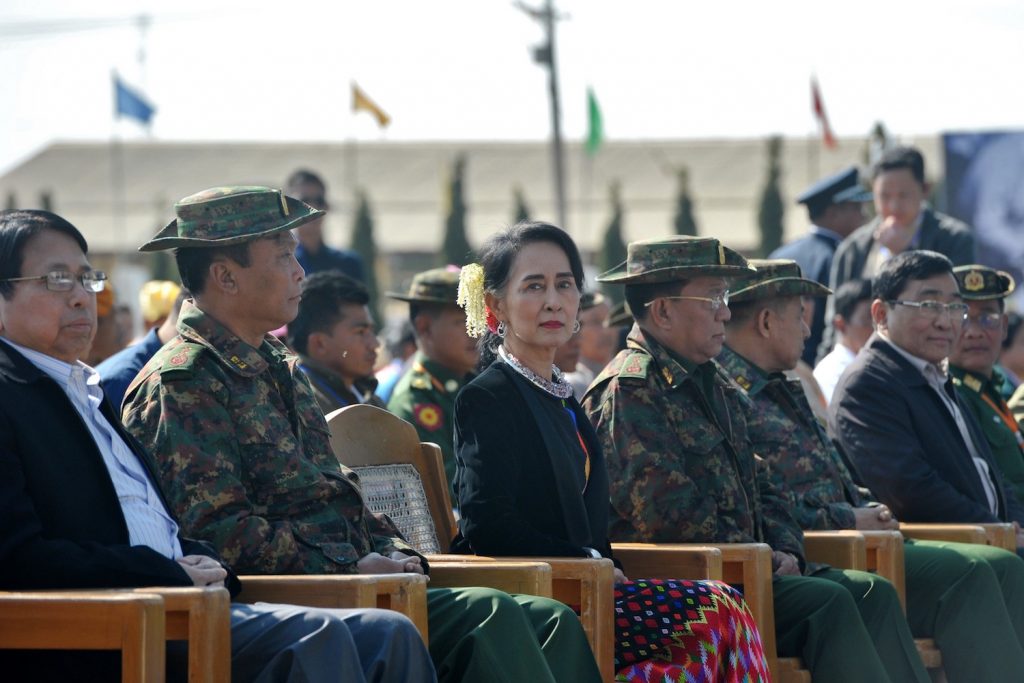
Peace process frustrations
Even in areas of the country with little conflict, the presence of armed groups can potentially influence the vote.
In 2015, some ethnic armed groups declined to endorse ethnic minority parties or even encouraged their supporters to vote for the NLD, in the belief that if the party won the election and formed government it would strengthen the hand of ethnic armed groups in their peace negotiations with the military.
Although the NLD formed government, ethnic armed groups have been disappointed by its leadership of the peace process, with little progress made over the past five years. As a result, several have switched their allegiance this year, encouraging voters to support ethnic-based parties.
Their hope is that strengthened ethnic representation in national and state assemblies will improve their negotiating position, both by emphasising the need for decentralisation and giving them an expanded presence at Union Peace Conferences, which reserve some positions for political parties in negotiations.
Among those that have switched is the Karenni National Progressive Party, which signed a bilateral ceasefire with the previous USDP government in 2012 but strongly backed the NLD’s candidates in their native Kayah State in the 2015 election, Pyithu Hluttaw lawmaker Dr Khin Sithu (NLD, Loikaw) told Frontier in August.
KNPP secretary Khu Daniel said this time around the group wanted ethnic parties to win seats in Kayah State. “A government formed by local ethnic people is more likely to listen and work closely with the people,” he told Frontier.
[The New Mon State Party] want to send a message that an election held under this constitution cannot solve the main problems in the country.
Nai Mann, senior journalist with Mon News Agency
Meanwhile, in Kayin State, the Karen National Union has endorsed Karen parties like the newly formed Karen National Democratic Party, issuing a statement on October 15, the fifth anniversary of the NCA signing, in which it urged the Karen people “to bravely vote for the Karens and Karen political parties in the forthcoming elections”.
In 2015, the KNU did not publicly back any political party. Asked about the change in policy, the KNU general secretary Saw Ta Doh Moo told Frontier that the group now believed that the “Karen people can achieve our goals faster by participating in [both] the parliamentary and non-parliamentary channels”.
The KNU’s cooperation has also resulted in fewer cancellations of voting in Kayin State than in 2015. Voting was cancelled in 53 of 188 village tracts this year, down from 94 – around half of the state – five years ago. Illustrating the potential importance of the expansion of voting to the election outcome in some areas, the KNU has reportedly agreed to transport voters from its territory to polling stations on election day.
The picture is similar in Mon State. Although the New Mon State Party has not issued a public statement in support of the Mon Unity Party, the ethnic armed group played an integral behind-the-scenes role in its formation in 2019 from a merger between two existing Mon parties that competed in 2015.
Nai Seik Lyi, the MUP’s general secretary for Kyainseikgyi Township in Kayin State, said because the NMSP is confident the MUP will succeed in ethnic Mon constituencies, it does not feel the need to publicly express support for the group.
Instead, the NMSP – similarly to the TNLA – is using its neutral position to make a political statement, particularly about the need to amend the constitution to introduce a federal system of government. The ethnic armed group has been disappointed at the NLD’s failure to amend the constitution, and also at some of the political positions the NLD has taken that resemble the policies of the Tatmadaw.
“Actually, they want to show that they aren’t interested in the election,” said Nai Mann, a senior journalist from the Mon News Agency. “They want to send a message that an election held under this constitution cannot solve the main problems in the country.”
The NMSP refused to allow any party to campaign in around two dozen villages under its control in the Taung Pauk area of Kyainseikgyi Township, citing the need to prevent the spread of COVID-19. It eventually relented after multiple requests from the MUP.
But sources say the NMSP is still keen to see the MUP win a majority in the Mon State hluttaw, to provide further momentum for political change, particularly constitutional reform.
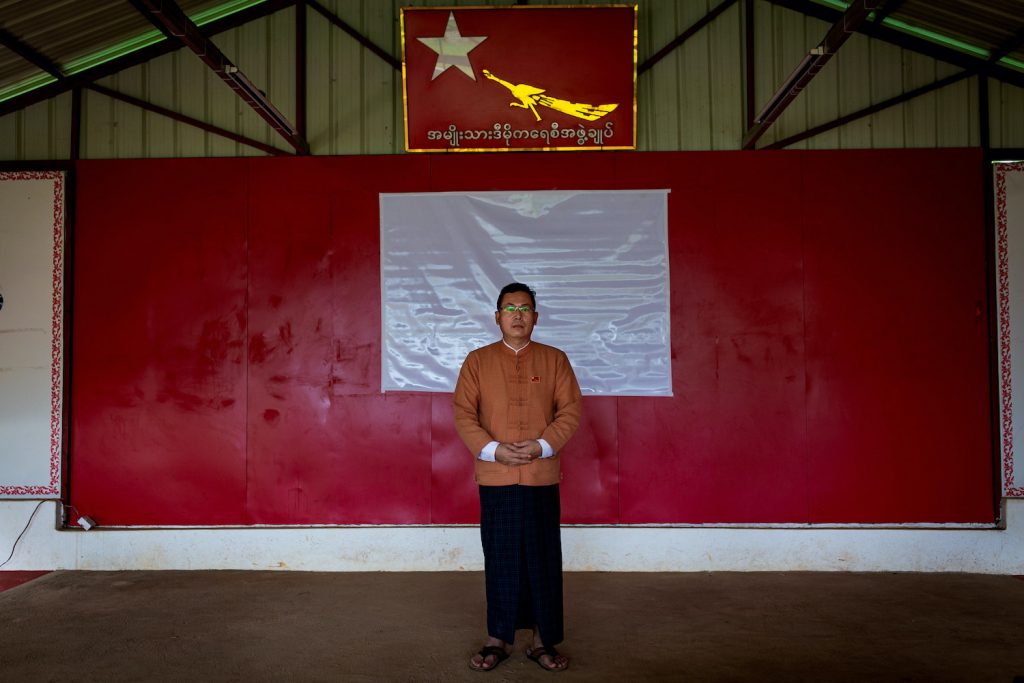
The military, USDP and militias
There is one other armed group that plays a decisive role in shaping the conduct and outcome of the election: the Tatmadaw, together with its Border Guard Forces and allied militias.
In the 2010 election, the military was accused of rigging the vote for the USDP in many races by delivering large numbers of out-of-constituency advance votes, ostensibly from its soldiers, to polling booths on election day.
Although an amendment to electoral by-laws enacted earlier this year requires polling stations to be moved outside of military cantonments on election day, out-of-constituency advance voting by soldiers remains shrouded in secrecy and is a potent fraud risk.
In townships with resident military populations, election sub-commissions posted ballots to soldiers serving temporarily in other parts of the country. The soldiers had between October 8 and 21 to mark these ballots in circumstances arranged by their commanding officers, beyond the view of any election officials, let alone independent monitors or political party observers. The marked ballots then had to be posted back to the relevant township sub-commission for counting on election day.
In 2015, advance votes were less controversial than in 2010, though this was largely because the margins of victory in most constituencies were reasonably wide. Races might be tighter this year, though, particularly in USDP-held garrison towns in Shan, where soldiers make up a significant proportion of the electorate. In these areas, advance votes from military personnel and their families could prove important for USDP success.
Many USDP candidates, meanwhile, have a military background. In some parts of the country – particularly northern Shan – the party has also recruited leaders of ethnic minority militias as candidates, including Pansay Militia chief U Kyaw Myint and Tarmoenye Militia leader U Myint Lwin.
In this year’s election, tensions have arisen over Tatmadaw troop movements that some perceive are an effort to shape the outcome of seats with relatively small numbers of voters. Such a strategy would be helped by another amendment to election by-laws, also enacted earlier this year, that allows voters to register to vote in an area after only 90 days’ residency, down from 180 days previously.
Others have expressed concern that recent troop movements on the part of both the Tatmadaw and ethnic armed groups could lead to clashes that would result in voting being cancelled.
Local sources told Frontier that the Tatmadaw moved at least 700 troops to northern Shan in August, but Tatmadaw spokesperson Brigadier-General Zaw Min Tun has said this was in response to the RCSS strengthening its forces with new recruitment in June and July. Numerous clashes broke out in Kyaukme Township around that time, prompting the UEC to cancel voting in 12 village tracts in the township.
But it’s the out-of-constituency advance voting, which typically favours the USDP, that has some parties nervous.
In 2015, advance votes helped then-Vice President Dr Sai Mauk Kham to claim the Pyithu Hluttaw seat of Lashio. The NLD candidate, U Tun Shwe, enjoyed a 49-ballot margin on votes cast on the day, but Sai Mauk Kham won on the back of 5,000 advance votes.
“The votes came in big boxes from the front line,” recalled one NLD member. “They were all for the USDP.”
Despite the need for vigilance in constituencies with many military voters, there are far fewer independent local observers in northern Shan compared to 2015.
U Nit San Oo, the secretary of the election sub-commission for northern Shan, told Frontier in August that no election monitoring groups had applied yet to observe the election in northern Shan State. In 2015, there were 500 to 800 observers, he said.
Sai Yin Htun, the NLD Pyithu Hluttaw candidate for Lashio, said he’s worried about what might happen on November 8 given the lack of observers. With conflict and militarisation increasing, he’s also pessimistic about the NLD’s chances in northern Shan. The party did poorly in the state overall in 2015, coming third after the SNLD in second and the USDP in first place.
Compared to the 1990 election, he said, “it was hard to win seats in 2015, and I think this year will be even more difficult.”


